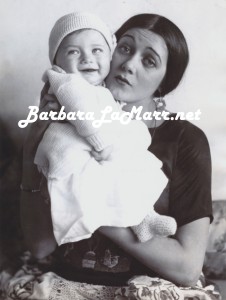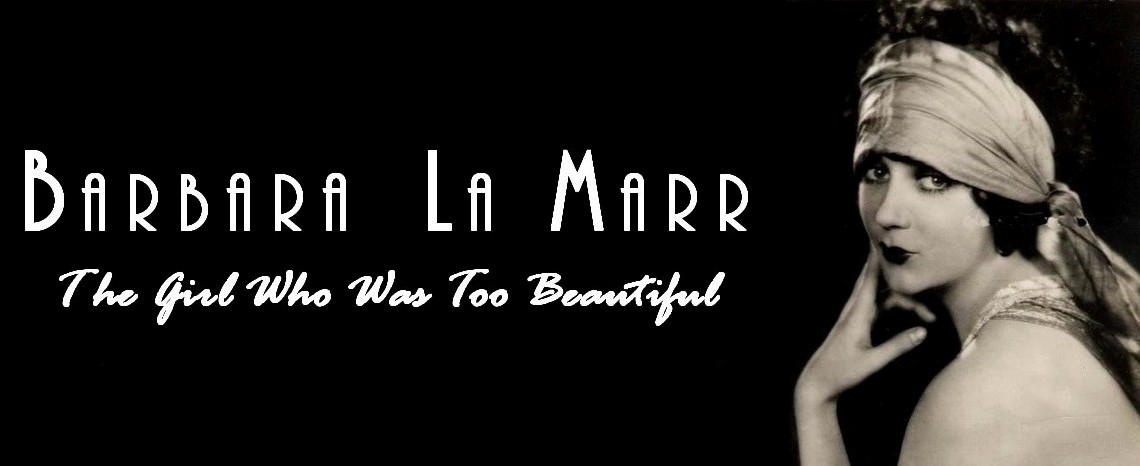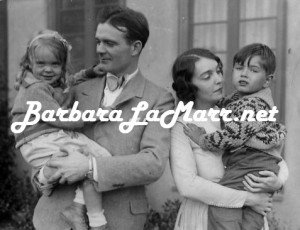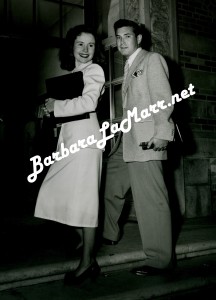He was unwittingly thrust into the spotlight in February of 1923, when he was around seven months old. Barbara La Marr, rising star of the silent screen, had traveled from Los Angeles to Dallas, Texas, under the guise of headlining the annual Southwestern Automobile Show. While in Dallas, Barbara visited the Hope Cottage orphans’ home, emerging with an adorable blue-eyed infant in her arms and a cluster of awaiting reporters on her heels. Beaming proudly, she introduced the child as Marvin Carville La Marr. Newspapers and film magazines the world over were soon ablaze: “World’s Wickedest Vamp Adopts a Baby,” “A Little Piece of Texas Goes to Hollywood,” “To Barbara La Marr belongs the credit for staging the greatest surprise for the Hollywoodites this season…”
It was exactly what Barbara wanted the film industry, her fans, and the rest of the world to believe. The reality, however, was something far different: having become pregnant after separating from her most recent husband, she had secretly given birth to the boy in California. Concealment of his existence had been a necessary evil in a society where so-called immoral behavior was intolerable, in an era when studios guarded their stars’ reputations at all costs. By staging her baby’s adoption in order to keep him, Barbara had risked everything. Consummate actress that she was, she maintained the charade the rest of her life.
To a select few, Barbara confided the truth; to all who would listen, she proclaimed her adoration for her son. Little “Sonny”—so nicknamed for his perpetual cheerfulness—made her life worth living, she said. She joyously discussed her plans for his future: he would receive a fine, character-building education in a military school…the two of them would travel the world together…she would support him in whatever career he chose… Above all, she explained, was her intention to bring him up to be the sort of man she had always wanted to marry, but had yet to find.

Barbara cuddling her pride and joy. To her detractors who deemed a film vamp unsuitable for motherhood, Barbara declared, “There is more motherhood in my little finger than in the whole body of the majority of mothers.”
Tragically, Barbara would not see the fulfillment of her dreams for Sonny. She contracted tuberculosis and passed away on January 30, 1926, at the age of twenty-nine. On her deathbed, she made one final plan for her cherished boy: she entrusted her dear friend, actress ZaSu Pitts, with his care and keeping. In ZaSu’s home, he would have a spunky sister his same age, a father figure in the person of Tom Gallery (ZaSu’s husband), and the love and tenderness Barbara could no longer give him. The Gallerys welcomed three-year-old Sonny as their own, legally adopting him that November and christening him Donald Michael Gallery. Eight decades later, with a wistful tone in his voice, Donald would admit to having no memories of Barbara.
Among Donald’s earliest recollections, originating in the innocent naiveté of his boyhood, was the notion that every child grew up as he did. His home, nestled along Rockingham Road in the exclusive Los Angeles suburb of Brentwood, offered a view of the shimmering Pacific—as well as the occasional eyeful of Greta Garbo sunbathing in the nude by her swimming pool next door. His sprawling backyard housed a pony he shared with his sister. When ZaSu purchased a pet cow during the meager years of the Great Depression, he enjoyed fresh milk and homemade ice cream. His neighborhood was a constellation of some of the screen’s most notable luminaries. Shirley Temple, Judy Garland, and Leatrice Gilbert (daughter of John Gilbert and Leatrice Joy) were among his playmates. Besides Garbo, the likes of Clark Gable, Joan Crawford, Elizabeth Taylor, Claudette Colbert, Barbara Stanwyck, Mary Astor, and Gloria Swanson lived nearby at different times. Many of them were frequent guests in his home. Young Donald also looked forward to weekly visits and gifts from Barbara’s friend and his godfather, MGM director and producer Paul Bern.
Like Barbara before her, ZaSu—who eschewed the words “adopted” and “step”—never missed an opportunity to brag about her son to friends and inquiring journalists. Inherently bright and dedicated to his studies, he was an honor student at Brentwood Town and Country School and, later, Webb Boarding Preparatory School for boys. Mild-mannered and well-behaved, he considered his sister a friend and rarely—if ever—squabbled with her. Sharing Barbara’s innate magnetism, he delighted all who met him. “Don Mike,” decreed ZaSu to one newspaperman, “is an angel.”
ZaSu’s assessment was echoed by many, particularly as Donald grew into manhood. The epitome of the handsome, all-American “boy next door” and ever the gentleman, he was one of the rare young men whom even the wariest parents trusted with their daughters. Shirley Temple was one such daughter. For years, Donald escorted the dainty superstar (by then a teenager) to parties, nightclubs, film premieres, and other social gatherings. He later insisted that their dates were merely “friendly,” although Shirley regularly adorned herself in his college varsity sweater—even at her high school where, risking censure for having violated the uniform policy, she carried her books against her chest. Donald was hand-picked by Elizabeth Taylor’s mother to distract Elizabeth, nine years Donald’s junior and already a budding bombshell, from someone she considered to be a less suitable associate. The scheme was a success: Elizabeth delighted in the frat parties they attended, the card games they played, and the long talks they shared. Don, in turn, relished her company and—despite her crush on him—made good on Mrs. Taylor’s request that he keep things on friendly terms.
In September of 1942, while his general inclination to date one girl at a time was surely breaking hearts, twenty-year-old Donald broke his “Mama ZaSu’s” heart. Months earlier, her boy had been studying business, hitting tennis balls, and leading cheers with the squad team at Stanford University. Now he had taken his life into his own hands. With the Second World War raging and the tragedy at Pearl Harbor still gnawing at the nation’s soul, Donald confessed to enlisting in the United States Army Air Corps. After recovering from shock and terror, ZaSu drew upon her connections. Following Donald’s completion of fighter pilot training at Luke Air Field in Arizona, he was transferred—to his dismay and owing to ZaSu’s string-pulling—out of the Air Corps. He was instead given an assignment as a “spy catcher” in the Counter Intelligence Corps (the precursor to the CIA) and shipped to Liverpool, England. The ultimate decision to employ Donald in such a capacity was not made lightly; CIC agents were meticulously chosen for their solid reputations as upstanding, reliable men. Donald excelled at his duties and briefly remained with the CIC after the war’s end to help round up war criminals.
He returned to Los Angeles in the spring of 1946. His next step was Warner Bros. Studios and the silver screen. During the day, he played small parts in films such as Wallflower (1948) and, in the early 1950s, The Boy Next Door. He continued his studies at UCLA in the evenings. By 1950, he had found a position as an “insurance eye”—that is, an investigator with an insurance company. He had also found a bride. Encouraged by studio heads who played him up as a war hero, he wed pretty Warner Bros. starlet Joyce Reynolds October 24, 1947. The short-lived union ended four years later. “We were young,” Donald said politely in 2010—and let it go at that.
Three decades passed before Donald laid eyes on the love of his life. He was a newcomer to Catalina Island at the time, temporarily recruited from the California mainland by the owners of Guided Discoveries to teach sailing to children at their summer camp. “They fell in love with him, like most people do,” his wife recalled years later. When Guided Discoveries invited Donald to stay on, he accepted—quite possibly due to a lovely, elegant local he had met. That woman, Patricia, became Mrs. Donald Gallery in 1985. They remained on the island for many years, he with an ice cream store he had purchased, she with her jewel shop. They traveled throughout the world; he even took her to a quaint town in the Swiss countryside where, long before, war-weary villagers had given him and his G. I. comrades a rousing ovation. The happy couple retired to Puerto Vallarta, Mexico, in 1993. There, Donald served as president of a writer’s group and enjoyed twenty-one more wonderful years with, as he was fond of saying, “the greatest wife in the world.”
On the afternoon of October 11, 2014, at the age of ninety-two years, Donald passed away quietly in his home during his usual afternoon nap. “He had the most peaceful, beautiful look on his face,” Patricia, who had been by his side watching television, remarked.
A few years before his passing, Donald professed to have “no regrets” over the way his life had turned out. He did, however, harbor a persistent longing. “I wish I could have known Barbara,” he admitted. ZaSu had been honest with him from the time he was old enough to understand, explaining that Barbara was his mother and that she had gone to heaven. Throughout the years, as Donald collected Barbara’s photographs from memorabilia shops, gazed at her image upon withering cutouts from old film magazines, and viewed her few surviving films, his mind spun with unanswered questions. His conversations with those who had known Barbara provided some answers (among them, how Barbara had pulled off his mock adoption; “It’s like a spy novel,” he said). Others were more elusive. He wondered who his father was. Several of Barbara’s friends offered him their own theories, but ultimately he would never know for sure. Barbara confided to one of her friends that she did not want her son to know who his father was; to another, she confessed merely that her son was the product of a bitterly broken romance. Barbara’s heartbreak not only fueled her growing disillusionment with men, it further prompted her to pour all of her love into her only child. Certainly, it factored into her determination to make the best man of him that she could. Had she but known the man her boy became, Barbara would be proud indeed.
Forever in our hearts: Donald Michael Gallery July 29,* 1922 – October 11, 2014
* It should be noted that, due to the secrecy surrounding Donald’s birth and Barbara’s staging of his adoption, his birthday cannot be determined from available records and was unknown even to him. A gap in Barbara’s work schedule at Metro Pictures indicates that it occurred sometime between the end of June and mid-July 1922. ZaSu Pitts nonspecifically placed the date around the end of June. Complicating matters is the seeming nonexistence of an official birth certificate for Donald. Decades later, in order to enlist in the United States Army Air Corps, he requested a birth certificate from Hope Cottage with perplexing results; he received three different birth certificates from the orphanage, all with conflicting dates and months, and all guaranteed to be correct at various times. On one, his birthday is documented as being the same as Barbara’s, July 28 (but in 1922, not 1896). He ultimately decided to celebrate his birthday on July 29, a date recorded on another of the certificates. ZaSu, as a busy actress raising both Donald and her daughter, always celebrated her children’s birthdays with a party on the same day—the date of her daughter’s birth—in April.
Related post, “A Very Sad Announcement.”
©2014 Sherri Snyder



